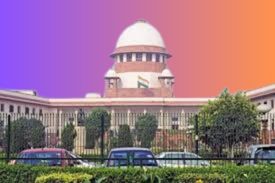Allowing the petition holding that the appellant had lien over his previous post and directing respondent-University to pay service and pensionary benefits, was set-aside. (Para 1)
In the present case, the short questions of law which fall for consideration are –
(i) Whether the order dated 08.04.1993 passed by the Respondent- Gulbarga University pursuant to Rule 252(b) of Karnataka Civil Service Rules (for short “KCS Rules”), ‘relieving’ the appellant to accept another appointment as ‘Assistant Registrar’ ought to be treated as an order accepting ‘resignation’, to take up the post on new assignment?
(ii) Whether in the facts of the case, on joining the new post, the appellant’s lien on the original/previous post will be continued to be maintained, until he is permanently absorbed in the new department or cadre in which he is subsequently appointed?
(iii) Whether in the facts and circumstances of the case, the relief as prayed by the appellant in the writ petition to consider him for appointment on the post of Assistant Registrar in the previous/original cadre at par with his juniors and consequential benefits on retirement can be allowed? If yes, to what extent? (Para 2)
On his appointment, respondent-University vide office order dated 08.04.1993 relieved the appellant from the post of Office Superintendent w.e.f. 04.02.1993, and duly recorded that he is being relieved to accept the another appointment as ‘Assistant Registrar’ in the Gulbarga University. (Para 4)
Pursuant thereto, the appellant joined on the post of Assistant Registrar in the respondent-University. (Para 4)
The appellant continued on probation on the post of Assistant Registrar. Thereafter, the High Court vide order dated 24.06.1998 allowed Writ Petition No. 5364 of 1993 and quashed the appointment of the appellant for reasons recorded in the order. (Para 5)
Pursuant to the dismissal of the writ appeals, the respondent-University in compliance of the orders, withdrew the appointment of the appellant as Assistant Registrar vide office order dated 23.12.2000 (hereinafter referred to as “Resolution”) and retained/placed him back in his previous post of ‘Office Superintendent’ with immediate effect. (Para 6)
The High Court passed an Interim Order that the operation of the earlier order dated 24.6.1998 passed in W.P. No. 5364/1993 was stayed pending admission of W.A.
The Division Bench of the Hon’ble Court of Karnataka has held in its order dated 29th Sept. 2000 in both the W.A.s that the learned Single Judge was right in quashing the order of appointment dated 4.2.1993 in respondent (sic) of Sri L.R. Patil as Assist. Registrar in Gulbarga University, Gulbarga. There is neither irregularity nor illegality in the order of the learned Single Judge. The above appeals were dismissed by the High Court.
It is observed that Sri L.R. Patil, has not maintained the lien on his previous post, i.e., Office Superintendent with the approval of competent authority as required under General Rules 17 of K.C.S.Rs.” (Para 6)
In the meantime, the appellant superannuated on 30.06.2007 from the post of ‘Office Superintendent’. (Para 8)
Rule 252(b) – Registration (sic[Registration]) of an appointment to take up, with proper permission, another appointment, whether permanent or temporary, service in which counts in full or in part, is not a resignation of public service.” (Para 14)
On perusal of the aforesaid Rule, it is clear that if a government servant seeks employment in another unit or department or in another cadre or grade in the same department under the Rules, his/her lien on the original appointment shall be continued to be maintained until absorbed in the department or cadre in which he/she is newly appointed. In case the employee is absorbed, he/she shall be entitled to the benefit of the past service for the purpose of leave and pension (Para 14)
In view of the discussion made herein above, we answer the questions framed above as follows –
(i) Order dated 08.04.1993 passed by respondent-University, relieving the appellant to take up the new appointment as ‘Assistant Registrar’ is not to be treated as resignation in terms of Rule 252(b) of KCS Rules.
(ii) The appellant’s lien on the original/previous post of ‘Office Superintendent’ shall be maintained and deemed to be continued from the date when he was relieved by respondent- University, i.e., 08.04.1993.
(iii) Considering the facts and circumstances of the case and in order to do complete justice, the appellant will be entitled to all the service benefits including seniority, consequential promotions and pensionary benefits at par with his juniors, though notionally, since he superannuated on 30.06.2007 and has not worked on the promoted post. (Para 21)
SUPREME COURT OF INDIA
2023 STPL(Web) 236 SC
[2023 INSC 796]
L.R. Patil Vs. Gulbarga University, Gulbarga
Civil Appeal No. 3254 of 2013-Decided on 4-5-2023
https://stpllaw.in/wp-content/uploads/2023/09/2023-STPLWeb-236-SC.pdf







